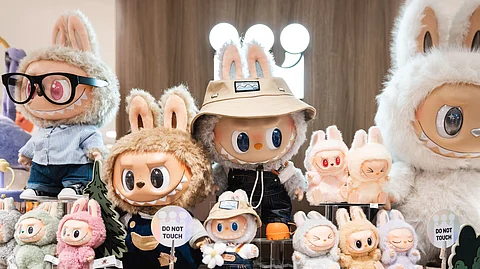

A once-niche Chinese collectible toy has evolved into a global sensation, sparking long queues, viral trends, and soaring sales, while offering Beijing an unexpected avenue to bolster its international image.
Labubu, a plush toy created by Hong Kong-born designer Kasing Lung and popularised through a partnership with Chinese retailer Pop Mart in 2019, has triggered worldwide enthusiasm, particularly among younger consumers. The dolls are sold in "blind boxes", leaving buyers unaware of which character they will receive—an element that has added to the excitement.
Pop Mart reported Labubu sales of $423 million (approximately ₹3,500 crore) last year, contributing significantly to its total annual revenue of $1.8 billion (around ₹15,000 crore). The brand’s surging popularity has propelled Pop Mart’s market capitalisation to $41 billion (roughly ₹3.42 lakh-crore), exceeding that of US toy giants Mattel and Hasbro combined.
In the US, Labubu dolls retail for around $30 (₹2,500), but rarer versions can fetch several thousands of dollars on the secondary market. A recent auction in Beijing saw a single Labubu figure sold for $1,72,000 (₹1.43 crore).
The phenomenon has been widely seen as one of the few globally successful, home-grown pop culture exports from China. Traditionally known as a manufacturing hub for international toy brands like Beanie Babies, Tamagotchis and Fidget Spinners, China now finds itself exporting its own cultural symbols—with 40 percent of Labubu’s sales reportedly coming from outside the country.
Brand analysts have attributed the doll’s appeal to its unconventional aesthetic—straddling the line between cute and bizarre—and to the emotional connections consumers are able to form with its ambiguous identity. Marketing experts believe that the lack of overt Chinese branding has allowed Labubu to be embraced by Western audiences without the political baggage often associated with products linked to China.
The toy’s rise comes amid China's broader efforts to enhance its soft power, particularly in the face of strained relations with Western countries over issues such as human rights, trade disputes, and geopolitical tensions in the South China Sea.
Observers suggested that Labubu's popularity presents a rare opportunity for China to project a more playful and approachable image at a time of heightened global suspicion. However, the soft power gains remain uneven. Surveys have shown that many Western consumers are unaware of Labubu’s Chinese origins. In the US, many consumers appeared to associate the toy more with online trends and personal expression than with China.
Labubu has not been without controversy. Chinese state media recently criticised the blind-box sales model, warning that it may encourage addictive consumer behaviour among young people. Elsewhere, authorities in Iraq’s Kurdistan region reportedly banned the toy and confiscated thousands of units, following conspiracy theories linking it to health risks and superstitions.
Despite such concerns, the toy has maintained a firm grip on the global market. In July, the opening of a new Pop Mart outlet in Las Vegas attracted hundreds of fans, some of whom queued overnight to purchase Labubu dolls.
The toy’s success is reminiscent of previous pop culture waves from other Asian countries, including Japanese anime collectibles and South Korean K-pop merchandise. Like those phenomena, Labubu’s appeal lies in its ability to capture the imagination of a younger, social media-savvy audience, many of whom are less influenced by geopolitical narratives.
Chinese officials have welcomed the rise of cultural exports such as Labubu, alongside video games like Genshin Impact and Black Myth: Wukong, and films including Crouching Tiger, Hidden Dragon and Ne Zha 2. A spokesperson from China’s foreign ministry recently described such exports as part of a modern, confident image of China, claiming that they allow global audiences to experience an “ever-cooler” China.
In the 2025 Soft Power Index, published by the consultancy Brand Finance, while the US retained its global lead, China rose to the second position—overtaking the UK.
Some believe that any attempt to instrumentalise Labubu too overtly may risk diminishing its charm and authenticity, particularly in foreign markets where consumers remain wary of China's strategic intentions.
In the meantime, demand for Labubu shows no signs of slowing. Retailers across major cities continue to report sold-out shelves, with collectors searching for rare editions and accessories for their dolls. While it remains uncertain whether Labubu will evolve into a long-term soft power asset, it has already succeeded in capturing the global imagination—one blind box at a time.